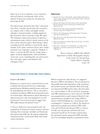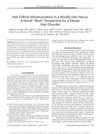January 2020 in “Journal of clinical and cosmetic dermatology” A woman with hair loss regrew hair using minoxidil and spironolactone.

Trichosol™ with Minoxidil can boost hair growth by 20%.
January 2022 in “Clinical Cases in Dermatology” Chemotherapy can cause significant but usually reversible hair loss, and managing it involves patient education and hair care strategies.
 2 citations,
July 2021 in “Dermatologic Therapy”
2 citations,
July 2021 in “Dermatologic Therapy” A woman's hair loss after COVID-19 was likely due to a mix of pressure-induced alopecia and acute telogen effluvium.
1 citations,
May 2022 in “Journal of Drugs in Dermatology” Low-dose naltrexone and platelet-rich plasma can regrow hair in lichen planopilaris.
 36 citations,
December 2012 in “Dermatologic Surgery”
36 citations,
December 2012 in “Dermatologic Surgery” Injecting platelet-rich plasma (PRP) can increase hair growth rate and density in male pattern baldness.
 6 citations,
February 2016 in “American Journal of Dermatopathology”
6 citations,
February 2016 in “American Journal of Dermatopathology” The boy with woolly hair nevus had thinner hair and abnormal hair follicles, which improved with treatment but worsened when treatment stopped.
 6 citations,
August 2006 in “Journal of Cutaneous Pathology”
6 citations,
August 2006 in “Journal of Cutaneous Pathology” Two teenage brothers had a rare, treatment-resistant form of female-pattern hair loss with unusual scalp changes.
 February 2012 in “Reactions Weekly”
February 2012 in “Reactions Weekly” A woman got male pattern baldness from touching her husband's testosterone gel.
 November 1997 in “Postgraduate Medicine”
November 1997 in “Postgraduate Medicine” Robert T. Leonard Jr. disagrees with Max Rubin's negative views on hair loss treatment, advocating for hormonal tests in women and supporting the use of medications and surgery for androgenetic alopecia.
Effective hair loss treatment in men involves personalized care and combination therapies.
 31 citations,
March 2017 in “Journal of The American Academy of Dermatology”
31 citations,
March 2017 in “Journal of The American Academy of Dermatology” Some breast cancer patients developed permanent hair loss after chemotherapy and hormonal therapy, showing patterns similar to common baldness and alopecia areata.
 30 citations,
August 2015 in “JAAD case reports”
30 citations,
August 2015 in “JAAD case reports” Platelet-rich plasma (PRP) injections successfully treated a woman's steroid-resistant hair loss, causing hair to regrow within a month.
 24 citations,
September 2001 in “Journal of Dermatological Science”
24 citations,
September 2001 in “Journal of Dermatological Science” Cyclosporin A helps damaged hair follicles regrow hair quickly.
 5 citations,
March 2011 in “Journal of pediatric health care”
5 citations,
March 2011 in “Journal of pediatric health care” The girl with autoimmune hair loss might regrow hair within a year, and treatments can help but not prevent recurrence; dermatologist referral and corticosteroids are recommended.
2 citations,
February 2021 in “Case reports in dermatological medicine” The new topical botanical formulation significantly regrew hair in all five patients without side effects.
 2 citations,
January 2023 in “Journal of Dermatology”
2 citations,
January 2023 in “Journal of Dermatology” Some types of hair loss can continue for a long time after recovering from a severe drug reaction known as DRESS.
 December 2024 in “Journal of Dermatological Treatment”
December 2024 in “Journal of Dermatological Treatment” Early treatment can help reverse hair loss caused by cosmetic fillers.
 September 2023 in “Journal of the Dermatology Nurses’ Association”
September 2023 in “Journal of the Dermatology Nurses’ Association” Platelet-Rich Plasma (PRP) may be a safe and effective treatment for hair loss caused by Alopecia Areata.
 April 2023 in “Revista colombiana de reumatología”
April 2023 in “Revista colombiana de reumatología” JAK inhibitors like tofacitinib can effectively treat severe alopecia areata.
December 2018 in “International journal of women’s dermatology” FFA in young women is often missed, and no single treatment works best.
 61 citations,
January 2019 in “American Journal of Clinical Dermatology”
61 citations,
January 2019 in “American Journal of Clinical Dermatology” The cause of Frontal Fibrosing Alopecia is unclear, diagnosis involves clinical evaluation and various treatments exist, but their effectiveness is uncertain.
 20 citations,
April 2014 in “Dermatologic Therapy”
20 citations,
April 2014 in “Dermatologic Therapy” Sulfotransferase in hair follicles helps predict how well minoxidil works for female hair loss.
 2 citations,
January 2015 in “Journal of cosmetology & trichology”
2 citations,
January 2015 in “Journal of cosmetology & trichology” Need better hair loss treatments beyond minoxidil, finasteride, and transplants.
 31 citations,
August 1975 in “Journal of Pharmaceutical Sciences”
31 citations,
August 1975 in “Journal of Pharmaceutical Sciences” Minoxidil metabolizes similarly in monkeys and humans, but differently in dogs and rats.
 26 citations,
August 2018 in “Dermatologic Therapy”
26 citations,
August 2018 in “Dermatologic Therapy” Minoxidil helps treat pattern hair loss in both men and women.
 14 citations,
August 2019 in “Journal of Dermatological Treatment”
14 citations,
August 2019 in “Journal of Dermatological Treatment” 10% minoxidil solution better promotes hair growth and reduces hair loss without significant side effects.
 11 citations,
April 2009 in “Pharmacotherapy”
11 citations,
April 2009 in “Pharmacotherapy” Minoxidil can cause deadly skin reaction; monitor patients closely.
 4 citations,
January 2016 in “Acta dermatovenerologica Alpina, Pannonica et Adriatica (Tiskana izd.)”
4 citations,
January 2016 in “Acta dermatovenerologica Alpina, Pannonica et Adriatica (Tiskana izd.)” 5% minoxidil foam is a safe, effective treatment for male pattern hair loss, with increased hair count and few side effects.
 September 2023 in “Translational medicine reports”
September 2023 in “Translational medicine reports” Minoxidil ingestion can raise liver enzyme levels.























